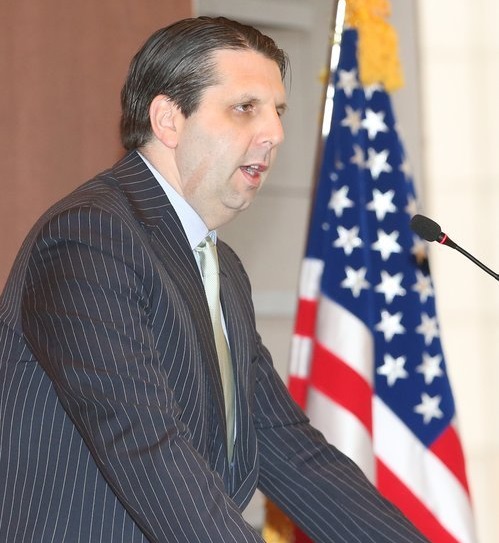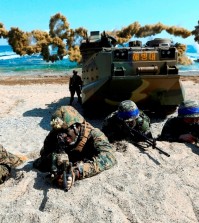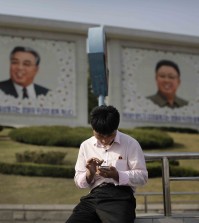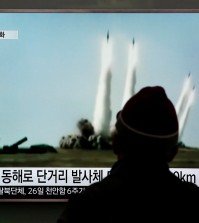- California Assembly OKs highest minimum wage in nation
- S. Korea unveils first graphic cigarette warnings
- US joins with South Korea, Japan in bid to deter North Korea
- LPGA golfer Chun In-gee finally back in action
- S. Korea won’t be top seed in final World Cup qualification round
- US men’s soccer misses 2nd straight Olympics
- US back on track in qualifying with 4-0 win over Guatemala
- High-intensity workout injuries spawn cottage industry
- CDC expands range of Zika mosquitoes into parts of Northeast
- Who knew? ‘The Walking Dead’ is helping families connect
Lippert urges N. Korea to come out for sincere talks on denuclearization

U.S. Ambassador to South Korea Mark Lippert speaks during a defense forum, organized by the state-run Korea Institute for Defense Analyses, at a Seoul hotel on April 15, 2015. (Yonhap)
SEOUL (Yonhap) — The top U.S. envoy here Wednesday urged North Korea to show sincerity for its denuclearization prior to reviving the long-stalled multilateral nuclear disarmament talks.
“We have reiterated many times that we are willing to engage in talks with North Korea but the government in Pyongyang must demonstrate that they are ready to engage in authentic and credible negotiations that lead to denuclearization,” Ambassador Mark Lippert said during a defense forum in Seoul.
He was referring to the six-party talks involving the two Koreas, Japan, China, Russia and the U.S., which aim to dismantle North Korea’s nuclear weapons program.
He warned Pyongyang that its dual policy of nuclear weapons and economic development will not succeed.
“The North Korean regime must realize it cannot succeed in pursuing economic development without denuclearization,” he said, noting that South Korea and the United States are “completely aligned” in their approach toward North Korea.
North Korean leader Kim Jong-un has become more isolated from the world by continuing to develop nuclear weapons, he said. “He’s more isolated than ever before. The sanctions are tougher than they’ve been. The other parties of the six-party talks are more unified.”
On the historical row between South Korea and Japan, Lippert expressed hope for healing and reconciliation between the sides.
“In terms of our role, we don’t play a formal mediation role but we do encourage both sides to find a solution that satisfies the people here in Seoul and the people in Tokyo,” he said, adding that these are very tough and very difficult issues.
He was responding to a question about the role Washington could play in drawing a statement of apology from Japanese Prime Minister Shinzo Abe when he addresses a joint session of the U.S. Congress on April 29.
Relations between Seoul and Tokyo have been badly frayed over issues stemming from Japan’s 1910-45 colonial rule of the Korean Peninsula. Seoul believes Japan is attempting to whitewash its wartime atrocities, including the mobilization of Korean and other Asian women as sex slaves for Japan’s World War II soldiers.
















